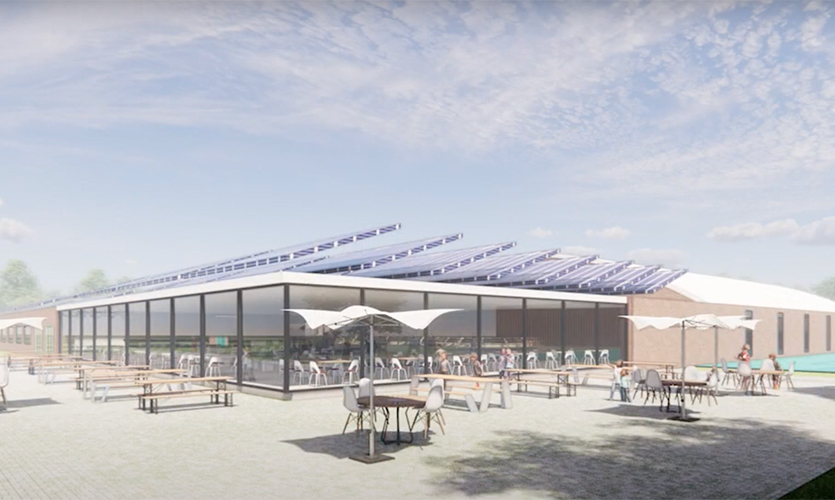 Undergraduate
UndergraduateStudent Team Wins Third-Place Honors at DOE Solar Decathlon
The design concept refurbishes a junior high, keeping sustainability and human experience at the forefront

engiNUity, an interdisciplinary Northwestern Engineering student team, has been named a 2023 Design Challenge Division Winner in the US Department of Energy (DOE) Solar Decathlon, earning third-place honors in the competition’s Education Building Division.
The Solar Decathlon is a collegiate competition that challenges students to design and construct high-performance, low-carbon buildings powered by renewable energy, while promoting innovation, STEM education, and workforce development opportunities in the buildings industry. engiNUity was one of 55 finalist teams from 43 collegiate institutions that competed during the Solar Decathlon Competition Event held April 20-23 in Golden, Colorado.
engiNUity’s winning design was for a renovation of Lisle Junior High School, a public middle school located about 25 miles west of Chicago last refurbished in 2003. The team of 16 students – 15 from the McCormick School of Engineering – aimed to modernize the facility with innovations in the floor plan, HVAC system, water management, and incorporation of renewable systems, making the campus a sustainable and feasible prototype for existing schools in the US by prioritizing the needs of students and the surrounding community.

“We really wanted to tackle something new and something that could change the way people think about sustainability,” said Polen Ton, a third-year student in civil engineering who served as the team lead. “Being able to find ways to make this a model and make our project a bit wider was important. We wanted to do something that other schools in the US could do.”
The design includes plans for a permeable parking lot to alleviate flooding of nearby houses, methods to produce clean energy, and a modernized HVAC system to keep occupants comfortable. Students, teachers, and staff will notice the increase in natural lighting and greenspace.
That last part was an emphasis for the team. The concept leverages natural elements to support a modern school design with contemporary features and a welcoming vibe.

“We wanted to bring a lot more nature into the school, a lot of sunlight, and windows to reduce the need for artificial light,” Ton said. “Students spend a lot of time in their classrooms and don’t get to enjoy the outdoors as much. We prioritized as many natural things as possible.”
The team collaborated with Neil Reindel, an associate at Perkins&Will and adjunct professor at Northwestern, to develop the plans. Industry partners included Lisle Junior High School, Arup Group, and Northbrook Park District. Giorgia Chinazzo, assistant professor of instruction and director of the Architectural Engineering and Design program, served as the team’s faculty adviser.
“It’s important to stress the fact that sustainability is not just being at net-zero or caring about energy efficiency,” Chinazzo said. “It’s really designing for people.”
The experience was a valuable one for Ton. Competitors must be creative, sharpen their pitches, and cultivate their ideas.
Solar Decathlon has taught me a lot about applying the knowledge we’ve learned in classes. It’s made me feel more connected to what’s going on around me.
“Solar Decathlon has taught me a lot about applying the knowledge we’ve learned in classes,” Ton said. “It’s made me feel more connected to what’s going on around me. With Solar Decathlon, I was able to focus on sustainability.”
Last year, engiNUity earned third-place honors in the competition’s Multifamily Building Division. In 2021, they were named the Solar Decathlon’s Design Challenge Grand Winner (Residential Divisions) for NUHome, a residential building concept for Chicago’s Lakeview neighborhood.
Ton’s teammates were Douglas Aris (civil engineering), Noora Bahrami (civil engineering), Asher Gunn (manufacturing and design engineering), Josh Holtgreive (civil engineering), Hajra Malik (civil engineering, minor in architecture), Dylan Meretsky (statistics), Hector Morales (civil engineering), Lola Mull (manufacturing and design engineering), Nasser Nduhi (civil engineering), Claire Petersen (biomedical engineering), Peter Pinder (civil engineering), Matt Schilling (computer engineering), Lachlan Stevens (manufacturing and design engineering), Robert Szymczyk (civil engineering), and Alonzo William (civil engineering).